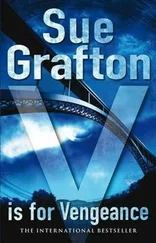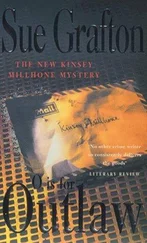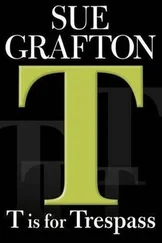She took the can out of the cooler, put ice in a paper cup, and extracted a small container of coleslaw from the back of the display case. She scribbled the total across the bottom of the ticket and tore it off with a flourish. He gave her a ten and she made change with the same efficiency. The timer on the steamer began to peep. She reached in with a hot mitt and flopped the steaming lobster on the paper plate. The guy had barely picked up his order when she untied her apron and let herself out the Dutch door to one side.
"We can sit out at one of the tables unless you'd rather go somewhere else. My car's parked over there. You want to talk in the car?"
"We can head in that direction. I really just have a couple of quick questions."
"You want to know what I was doing the night Aunt Isabelle was killed, right?"
"That's right." I was sorry Rhe'd had time to call her, but what could I do? Even if I'd come straight over, Rhe would have had time to telephone. Now Tippy'd had sufficient warning to cook up a good cover story… if she needed one.
"God, I've been trying to think. I was at my dad's, I guess."
I stared at her briefly. "You don't remember anything in particular about that night?"
"Not really. I was still in high school back then so I probably had a lot of homework or something."
"Weren't you out of school? That would have been the day after Christmas. Most kids have the week off between Christmas and New Year's."
She frowned slightly. "I must have been, if you say so. I really don't remember."
"You have any idea what time your mother called to tell you about Isabelle?"
"Uh, I think about an hour later. Like an hour after it happened. I know she called from Aunt Isabelle's, but I think she'd been there awhile with Simone."
"Is there any chance you might have been out around one or one-thirty?"
"One-thirty in the morning? You mean, like doing something?"
"Yes, a date, or maybe just bopping around with your buddies."
"Nunh-unh. My dad didn't like me to be out late."
"He was home that night?"
"Sure. Probably," she said.
"Do you remember what your mom said when she called?"
She thought about that for a moment. "I don't think so. I mean, I remember she woke me up and she was crying and all."
"Does your dad have a truck?"
"Just for work," she said. "He's a painting contractor and he carries his equipment in the pickup."
"He had the same truck back then?"
"He's had the same truck ever since I can remember. He needs a new one actually."
"The one he has is white?"
That one slowed her down some. A trick question perhaps? "Yeah," she said reluctantly. "Why?"
"Here's the deal," I said. "I talked to a guy who says he saw you out that night, driving a white pickup."
"Well, that's screwed. I wasn't out," she said with just a touch of indignation.
"What about your father? Maybe he was using the truck."
"I doubt it."
"What's his name? I can check it out with him. He might remember something."
"Go ahead. I don't care. It's Chris White. He lives on West Glen, down around the bend from my mom."
"Thanks. This has been real helpful."
That seemed to worry her. "It has?"
I shrugged and said, "Well, sure. If your father can verify the fact that you were home, then this other business is probably just a case of mistaken identity." I allowed just the tiniest note of misgiving to sound in my voice, a little bird of doubt singing in a distant part of the forest. The effect wasn't lost.
"Who was it said they saw me?"
"I wouldn't worry about it." I looked at my watch. "I better let you go."
"You want a ride or something? It's no trouble." Little Miss Helpful.
"I walked over from my place, but thanks. I'll talk to you later."
"Night," she said. Her parting smile seemed manufactured, one of those expressions clouded with conflicting emotions. If she didn't watch it, those little frown marks were going to require cosmetic surgery by the time she was thirty. I glanced back and she gave me a halfhearted wave, which I returned in kind. I headed back down the pier, thinking "Liar, liar, pants on fire" for reasons I couldn't name.
I dined that night on Cheerios and skim milk. I ate, bowl in hand, standing at the kitchen sink, while I stared out the window. I made my mind a blank, erasing the day's events in a cloud of chalk dust. I was still troubled about Tippy, but there was no point in trying to force the issue. I turned the whole business over to my subconscious for review. Whatever was bugging me would surface in time.
At 6:40, I left for my appointment with Francesca Voigt. Like most of the principal players in this drama, she and Kenneth Voigt lived in Horton Ravine. I drove west on Cabana and up the long, winding hill past Harley's Beach, entering the Ravine through the back gate. The entire Horton property was originally two ranches of more than three thousand acres each, combined and purchased in the mid-1800s by a sea captain named Robertson, who, in turn, sold the land to a sheep rancher named Tobias Horton. The land has since been subdivided into some 670 wooded parcels, ranging from one-and-a-half-acre to fifty-acre estates, laced with thirty miles of bridal paths. An aerial view might show that two houses, seemingly miles apart, were really only two lots away from each other, separated more by winding roads than by any actual geographical distance. In truth, David Barney wasn't the only one whose property was in range of Isabelle's.
The Voigts lived on what must have been six or eight acres, if one could judge property lines by the course of the fifteen-foot hedges that snaked along the road and cut down along the hillside. The shrubs and flower beds were all carefully tended, towering eucalyptus grouped together at the fringes. The driveway was a half circle with a bed of thickly planted pansies massed together in its center, a blend of deep reds and purples, petals vibrant in the glow of the landscape lighting. Off to the right, I could see horse stalls, a tack room, and an empty corral. The air smelled faintly musty, a blend of straw, dampness, and the various byproducts of horse butts.
The house was built low to the ground, white frame and white painted brick, with long brick terraces across the front, dark green plantation shutters flanking the wide mullioned windows. I left my car out in the drive, rang the bell, and waited. A stolid white maid in a black uniform opened the door. She was probably in her fifties and looked foreign for some reason-facial structure, body type… I wasn't really sure what it was. She didn't quite make eye contact. Her gaze came to rest right about at my clavicle and remained there as I indicated who I was and told her that I was expected. She made no reply, but she conveyed with body language that she comprehended my utterings.
I followed her across the polished white marble foyer and then trudged with her across white carpeting as thick and pristine as a heavy layer of snow. We passed through the living room-glass and chrome, not a knickknack or a book in sight. The room had been designed for a race of visiting giants. All the furniture was upholstered in white and oversize: big plump sofas, massive armchairs, the glass coffee table as large as a double-bed mattress. On a ponderous credenza, there was a bowl filled with wooden apples as big as softballs. The effect was strange, re-creating the same feelings I had when I was five. Perhaps, unbeknownst to myself, I'd begun to shrink.
We walked down a hallway wide enough for a snowplow. The maid paused at a door, knocked once, and opened it for me, staring politely at my sternum as I passed in front of her. Francesca was seated at a sewing machine in a room proportioned for humans, painted buttery yellow. One entire wall was covered by a beautifully organized custom-built cabinet that opened to reveal cubbyholes for patterns, bolts of fabric, trim, and sewing supplies. The room was airy, the interior light excellent, the pale hardwood floors sanded and varnished.
Читать дальше











